A sports video game is a video game that simulates the practice of sports. Most sports have been recreated with video games, including team sports, track and field, extreme sports, and combat sports. Some games emphasize playing the sport, whilst others emphasize strategy and sport management. Some, such as Need for Speed, Arch Rivals and Punch-Out!!, satirize the sport for comic effect. This genre has been popular throughout the history of video games and is competitive, just like real-world sports. A number of game series feature the names and characteristics of real teams and players, and are updated annually to reflect real-world changes. The sports genre is one of the oldest genres in gaming history.

Qix is a 1981 puzzle video game developed by husband and wife team Randy and Sandy Pfeiffer and published in arcades by Taito America. Qix is one of a handful of games made by Taito's American division. At the start of each level, the playing field is a large, empty rectangle, containing the Qix, an abstract stick-like entity that performs graceful but unpredictable motions within the confines of the rectangle. The objective is to draw lines that close off parts of the rectangle to fill in a set amount of the playfield.

Chase H.Q. is a vehicular combat racing game, originally released as an arcade video game by Taito in 1988. It is sometimes seen as a spiritual successor to Taito's earlier Full Throttle. The player assumes the role of a police officer named Tony Gibson, member of the "Chase Special Investigation Department". Along with his partner, Raymond Broady, he must stop fleeing criminals in high-speed pursuits in a black Porsche 928.

Super Street Fighter II: The New Challengers is a 1993 competitive fighting game produced by Capcom and originally released as an arcade game. It is the fourth game in the Street Fighter II sub-series of Street Fighter games, following Street Fighter II: Hyper Fighting (1992). It refines and balances the existing character roster from the previous versions, and introduces four new characters, including Cammy and Dee Jay. It is the first game on Capcom's CP System II hardware, with more sophisticated graphics and audio over the original CP System hardware used in previous versions of Street Fighter II.
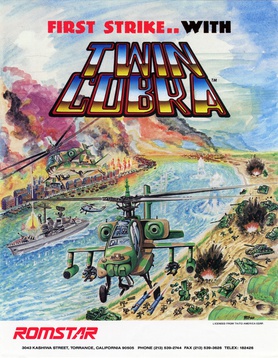
Twin Cobra, known as Kyukyoku Tiger in Japan, is a vertically scrolling shooter developed by Toaplan and released for arcades in 1987 by Taito in Japan and Europe, then in North America by Romstar. It is a sequel to the 1985 arcade game Tiger-Heli. Controlling the titular attack helicopter, the players must fight endless waves of military vehicles while avoiding collision with their projectiles and other obstacles. It was the fourth shoot 'em up game from Toaplan, and their tenth video game overall. It was ported to multiple platforms, with each done by different third-party developers that made several changes or additions.
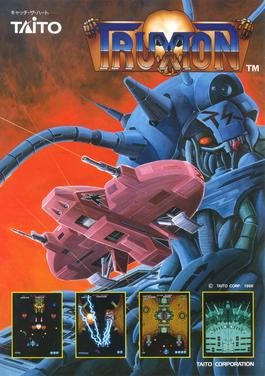
Truxton is a 1988 vertically scrolling shooter arcade video game originally developed by Toaplan and published in Japan and Europe by Taito, as well as in North America by Midway. Set in a future where the Gidans alien race led by Dogurava invaded the fictional planet Borogo, players assume the role of fighter pilot Tatsuo taking control of the Super Fighter ship on a last-ditch effort to overthrow the alien invaders.

Gals Panic is a series of Japanese eroge by Kaneko. The gameplay in the Gals Panic series is similar to Taito's classic puzzle game Qix; the objective is to control a marker on a board and uncover backgrounds, which depict women in a sexual nature. Many clones of Gals Panic were made after the original game achieved popularity in the 1990s.
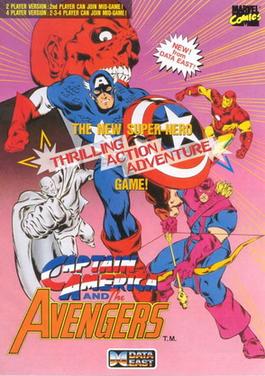
Captain America and the Avengers is a beat 'em up arcade game developed and released by Data East in 1991. It features the Avengers team of Marvel Comics characters in a side-scrolling brawling and shooting adventure to defeat the evil Red Skull. The game received ports for the Sega Genesis/Mega Drive, Super Nintendo Entertainment System, Game Boy and Game Gear. A different Data East game was released for the Nintendo Entertainment System.
Romstar Inc. was a video game distribution company based in Torrance, California that started operations in 1984. They originally started as the first American distribution arm for SNK. They were known for licensing arcade games from major makers for distribution. Among Romstar's clients include Taito, Capcom, SNK, Toaplan, and Seta. They also made games for the Nintendo Entertainment System, the Super Nintendo Entertainment System, and Game Boy. The ultimate fate of the company is not known. Games continued to be released using the Romstar name until at least 1994. It is also partnered with Capcom in 1993 to form Game Star, an electromechanical factory in Arlington Heights, Illinois that Romstar had a 30% stake in. In 1995, Capcom would later fully take over Game Star to form Capcom Coin-Op, a pinball manufacturer.

Air Buster is a 1990 horizontally scrolling shooter arcade video game developed by Kaneko. It was published by Namco in Japan and Sharp Image Electronics in North America. Two players control the "Blaster Fighter" star ships in their efforts to destroy a mysterious mechanical fortress orbiting Earth, with plans to take control of the planet. The Blaster Fighters can equip one of seven available weapons, which will change the ship's firepower and abilities, such as diagonal shots, homing missiles and small drones that follow the player's ship.
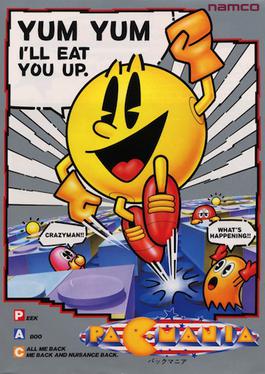
Pac-Mania is a cavalier perspective maze game that was developed and released by Namco for arcades in 1987. In the game, the player controls Pac-Man as he must eat all of the dots while avoiding the colored ghosts that chase him in the maze. Eating large flashing "Power Pellets" will allow Pac-Man to eat the ghosts for bonus points, which lasts for a short period of time. A new feature to this game allows Pac-Man to jump over the ghosts to evade capture. It is the ninth title in the Pac-Man video game series and was the last one developed for arcades up until the release of Pac-Man Arrangement in 1996. Development was directed by Pac-Man creator Toru Iwatani. It was licensed to Atari Games for release in North America.

Hellfire is a 1989 horizontally scrolling shooter arcade video game originally developed by Toaplan and published in Japan by Taito and North America by U.S.A. Games. The first horizontal shoot 'em up title to be created by Toaplan, the game takes place in the year 2998 where a space matter known as Black Nebula created by robot dictator Super Mech spreads and threatens to engulf human-controlled galaxies, as players assume the role of Space Federation member Captain Lancer taking control of the CNCS1 space fighter craft in a surprise attack to overthrow the enemies with the fighter craft's titular weapon.

Fire Shark is a 1989 vertically scrolling shooter arcade video game developed and published by Toaplan in Japan and Europe, and by Romstar in North America. It is the sequel to Flying Shark, a game released in 1987 on multiple platforms. Set in the year 1991, the game focuses on a mysterious armada launching a worldwide attack from a small island in the Mediterranean Sea. Players take control of the titular biplane to counterattack the enemy forces.

Granada is a shooter video game developed and originally published by Wolf Team exclusively for the X68000 in Japan on 20 April 1990. The ninth title to be created and released by Wolf Team for the X68000 platform, the game is set on a futuristic Africa in 2016 where a war erupted over mining rights towards rare metals and has quickly escalated due to newly-introduced weapons called Maneuver Cepters, as players assume the role of mercenary Leon Todo piloting the titular Maneuver Cepter tank unit in an attempt to stop the conflict once and for all. Its gameplay mainly consists of action and shooting mixed with mission-based exploration using a main two-button configuration.

M2 Co., Ltd. is a Japanese video game developer and publisher, best known for handling emulation of re-released games, such as some Sega Ages titles, Virtual Console titles for Nintendo systems, the 3D Classics series for the Nintendo 3DS and their ShotTriggers range of classic STG games. M2 has also created entirely new titles such as WiiWare games for Konami under the ReBirth moniker and more recently a new GG Aleste game. In addition, M2 currently holds the rights of Aleste series and all NEC Avenue and NEC Interchannel games on TurboGrafx-16 and variants, previously owned by Lightweight.
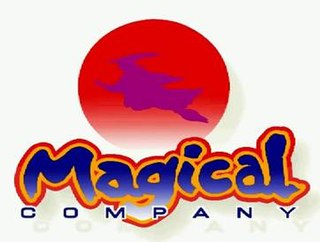
Magical Company ltd. (魔法株式会社), also known as Mahō, is a Japanese entertainment company.
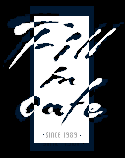
Fill-in-Cafe (フィルインカフェ) was a video game developer that was founded in Japan in 1987. They are best known for creating the Asuka 120% series.
Takeru, also known as Sur Dé Wave, was a Japanese video game developer.














